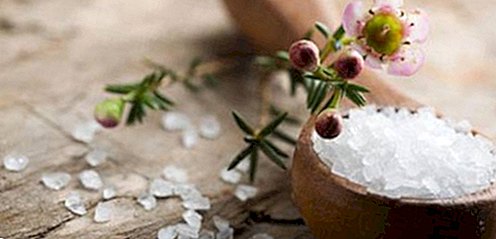How much salt is healthy?

Salt, the simple condiment, has arrived in the gourmet temple - finely made with noble flowers and spices, as Alpine, stone or smoked salt; Sun-ripened from Peru, hand-made from the Atlantic coast (Fleur de Sel) or mined from the Himalayas at full moon. Sea salt crumbs have made themselves comfortable on chocolate, as salted butter looks almost profane. Although it is particularly benefiting from the salt hype, the former niche product has recently sold itself.
But is salt really healthy? For a long time it was clear: less salt is the best protection against high blood pressure and cardiovascular diseases. Then a Belgian study calmed down: salt saving is therefore nonsense, does not protect against heart attacks and strokes and is even rather bad for the heart. But recently, at a congress of the American Heart Association, scientists again warned against salt, too much is responsible for cardiovascular disease and high blood pressure. Pretty confusing!
On average, we eat about 10 grams of salt per day, and the German Nutrition Society recommends only five (one teaspoon). But does salt really save anything? Or is everything only half as wild and salt maybe healthy? Finally, we need it for nerves and muscles and to regulate the water balance in the body.
Which studies can one believe?
The data is not unique. So there were quite a few studies that could prove despite infarction of salt no protection against infarction and stroke. The aforementioned Belgian study even shows an increased risk of heart attack with low salt intake. But the methodology of this study is being attacked by many experts. The study participants were on average too young, the observation time was too short and too few heart attacks occurred in order to make reasonable statements, say, for example, the largely lobby-independent Centers for Disease Control and Prevention in the US.
Even Prof. Martin Middeke, head of the Hypertension Center Munich and expert on salt and blood pressure, sees no reason to overturn the warning of too much salt in the food: "There are a variety of methodologically clean studies, which have clearly shown that the Blood pressure increases as more salt is eaten, and it is undisputed that high blood pressure is just as important a risk factor for heart attack and stroke as physical inactivity, obesity or cigarettes, and today, salt is not only detrimental to raising blood pressure but also accelerates the aging of the vessels directly. "
With high blood pressure: salt shaker gone?
That makes sense for high-pressure patients in any case. Blood pressure drops and sometimes you may need less medication. In healthy subjects, however, the blood pressure lowering effects are far less impressive, said Prof. Dieter Klaus, heart and kidney specialist and former chairman of the German High Pressure League: "Nevertheless, it is undisputed that ten grams of salt per day are too much Six grams per day would have saved a lot, and a daily intake of just one gram of salt, as recently claimed by various scientists based on current study data, is probably not very realistic in our dietary habits. "
But how can we save salt when a whopping 80 percent of our daily salt intake is in processed foods such as bread (up to one gram per slice), cheese, sausage, ready meals or soy sauces like soy sauce, ketchup and dips? Even the sausage from the snack or the goulash soup in the pub are often extremely salty. Really under control you have the salting only at home. Hypertension expert Middeke advises: "Try to cook noodles, rice or potatoes without salt and to salt for dinner."
Only half as wild?
Those who do not have too high blood pressure should not go crazy with saving salt, but reduce where the enjoyment does not suffer. Those who use less salt can even increase their enjoyment in the long run. Heart specialist Dieter Klaus puts it in a nutshell: "Since I eat low-salt, I perceive the intrinsic taste of food much more intense." Why not organize a taste training at home? Then you can not only determine the amount of salt, but also test the same, which is the turn of the trendy grit.
More information about this topic: www.hochdruckliga.de www.dge.de www.aid.de










